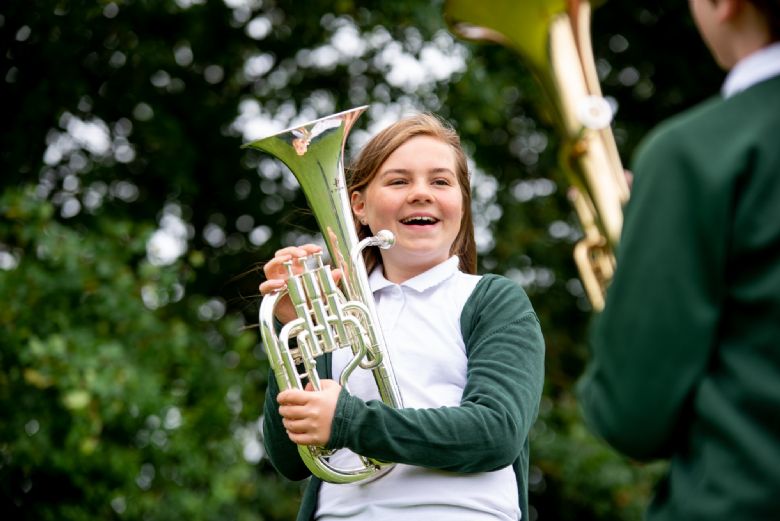Music
At Occold Primary School, we are passionate about providing a rich creative curriculum which enables all children to develop a lifelong love of music in order to enhance their wellbeing, to unleash their creativity and to give them opportunities to develop the foundation for a potential career in the Music industry.
Intent
An excellent music curriculum enables children to express themselves, to explore their creativity, to show resilience when faced with challenges, to persevere and prosper. It is these experiences and achievements which will stay with them and help shape their lives.
Being a musician maps the human mind for success; success in all avenues of life.
Tim Lautzenheiser
In line with the National Curriculum objectives for music, our intent is that all pupils:
- perform, listen to, review and evaluate music across a range of historical periods, genres, styles and traditions, including the works of the great composers and musicians
- learn to sing and to use their voices, to create and compose music on their own and with others, have the opportunity to learn a musical instrument, use technology appropriately and have the opportunity to progress to the next level of musical excellence
- understand and explore how music is created, produced and communicated, including through the interrelated dimensions: pitch, duration, dynamics, tempo, timbre, texture, structure and appropriate musical notations
Our approach to the teaching of music has been carefully considered and has been developed to enable both specialists and non-specialists to deliver a high quality curriculum. It also enables staff to teach beyond the statutory requirements, using the Model Music Curriculum and the National Plan for Music Education documents to inform what constitutes best practice.
Implementation
All children at Occold Primary School are taught Music for approximately one hour each week.
From the Early Years Foundation Stage to the end of Year 4, we use the Sing Up Music Scheme of Work. This has been chosen as it provides high quality materials (lesson content and resources) for all staff, irrespective of whether they are specialists or non-specialists. As part of this approach, all children in Years 3 and 4 learn to play the ukulele for at least one term each year.
For children in Years 5 & 6, fully funded weekly Whole Class Ensemble Teaching (WCET) lessons are provided by a peripatetic music teacher through the Suffolk Music Hub. A brass instrument is chosen by each child at the beginning of Year 5 (baritone horn, cornet or tenor horn) which is theirs to keep for two academic years.
Musician of the Week
A weekly assembly introduces the whole school to a ‘Musician of the Week’. Performers and composers throughout history and from a range of musical genres and cultures, from classical to contemporary, are shared with the children who have opportunities to listen to and appraise what they hear. These musicians are placed on a chronological timeline display to enable all children to develop a sense of the evolution of music and understand how artists are influenced by their predecessors.
Musical Assemblies
Additional whole school music teaching takes place in assemblies delivered by the subject lead. It is during this time that all children have opportunities to:
- learn songs, rehearse and sing together
- prepare for performances
- deepen their understanding of the world of classical music through BBC 10 pieces
- understand and explore how music is created, linking what they hear, perform and compose with the interrelated elements of music (duration, dynamics, harmony, pitch, pulse, rhythm, structure, tempo, texture, timbre)
Curriculum Impact
Performance
At Occold Primary School we recognise the value of public performance. Regular opportunities are created throughout the school year for children to perform musical pieces to an audience. This motivates pupils to rehearse and refine their techniques and appreciate the impact of their work on others. This also gives them the opportunity to respond to feedback. These events range from small local performances to parents e.g. Christmas and summer shows to large prestigious events such as the annual festival at Snape Maltings.
Assessment
Teachers check for understanding in each session and quickly identify those children in need of additional teaching/support. We find that the most powerful feedback is given to children verbally during lessons so that children can correct their work at the time. Self and peer assessment are also used when appropriate, although teachers will oversee this and acknowledge the work. If necessary, teachers will adapt their planning in accordance to the needs of the class.
This curriculum is for all our children. We aim to provide scaffolding and a variety of experiences for those with different needs before offering alternative content.
Subject Monitoring
The quality and impact of our music curriculum is monitored through a range of approaches. The subject leader undertakes regular observations of music lesson in all year groups, teacher interviews and pupil perception meetings. Further monitoring is carried out at both school and Trust level.

